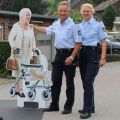The four of them know each other inside out. Willi Taubner has been with the road safety advisors for 35 years, Chief Superintendent Joachim Thiel for 12 years, Chief Superintendent Dirk Marten has been with the team for eight years and Senior Superintendent Melanie Birr joined the men's team two years ago. This team never gets bored. And that is not least due to the daily routine, which the four of them organize themselves.
"Even if you have to be flexible: Many appointments can still be planned in advance," explains Joachim Thiel. "After all, the hot phase always starts after the big vacations, when we present our work at various parents' evenings and then offer training sessions for the children." In addition to these dates, practical training courses such as pedestrian and bicycle driving licenses are also on the agenda. There are also various events for senior citizens.
In figures, this means 101 events in daycare centers, 45 pedestrian training sessions in elementary school, pedestrian tests for 1,805 schoolchildren and 27 parents' evenings with almost 1,000 parents in 2019. In addition, nine crash courses were attended by 2,307 pupils and two schools trained 30 school crossing guards last year.
Children copy their behavior
The aim of the road safety work is clearly defined: to reduce the number of accidents and minimize the consequences of accidents. The work is designed for the long term and is aimed at many different target groups. From children to adolescents, parents and senior citizens, everyone is addressed in different ways. "You can see that a conversation with parents often lasts longer than when they are handed a brochure or flyer," says Melanie Birr. "Unfortunately, parents don't pay enough attention to the topic of road safety. Many adults think that children perceive road traffic in the same way as they do. That they can tell from the sound from which direction a car is approaching. Or that a quick glance is enough for them to cross the road. But the opposite is the case. Children are sometimes not even able to grasp everything." But this is exactly what parents need to internalize and then implement when dealing with their children. "This also means looking left and right every time they cross the road," says Dirk Marten. "This is because children copy their behavior from their parents. If they seem to cross the road carelessly, the little ones will imitate them."
"You need a lot of passion"
Repeating this over and over again is part of the job. "Every school year, the work starts all over again and yet it doesn't feel like a Sisyphean task. We have the feeling that we are doing something worthwhile," says Melanie Birr with conviction. Dirk Marten explains what else is important for this job: "You have to be communicative, with a great deal of empathy and, of course, background knowledge. And last but not least, you need the passion to pass all this on to the many different people you deal with." And then he adds with a grin: "You also have to be weather-resistant. The police don't cancel appointments - we're out in the wind, rain or snow."
"I've had enough of hardship, suffering and brutality"Although Melanie Birr herself has worked as a police officer for more than 20 years, she first came into contact with the road safety advisors as a helping mother during her daughter's bike training. "I just loved this work," she recalls. "I had also already worked as a police officer for 20 years and had reached the point where I wanted to do something different and positive."
At some point, Dirk Marten felt the same way: "Unfortunately, as a police officer you see a lot of misery, suffering and brutality. You're often only called out when it's already too late, for example when a crime has already been committed." When he was approached to host the crash course, he didn't hesitate for long. The aim of the event is to shake up young people and novice drivers with dramatic images and first-hand accounts and to raise awareness of the issue. "I've been involved with the road safety advisors for eight years now and I'm still very happy with them," he says happily. Joachim Thiel can only agree: "I don't think many people have such a clear idea of what we do here and that you have to really step on the gas." At the same time, he has also found professional fulfillment in this job. "Children are the weakest road users. You have to strengthen them so that they are not exposed to unnecessary dangers." All four of them must always be in a good mood - no matter how they are feeling. "But even if I'm not in such a good mood, as soon as I enter the daycare center, a switch flips and I feel like a different person." Melanie Birr confirms this: "At that moment, you don't think about problems, you just look at what's good and right for the children."
Everyone has their own way of imparting their knowledge, whether to a playful nursery child or a hearing-impaired senior citizen. And understanding this was also a learning process for Melanie Birr, who was a newcomer at the time. "Of course I looked at how my colleagues do it," she explains thoughtfully, "but now I know that everyone has to do it their own way. If I were to copy someone because they're well received, that wouldn't be authentic either."
Police as saviors and helpers
And another thing is important to the team: they want children to lose their fear of the police. "Many parents threaten their children, along the lines of: if you don't stop, the police will come and lock you up," explains Dirk Marten.
"But that's exactly what we want to avoid. If something happens, we want children to turn to a police officer and not ask a stranger for help."
Maybe, he hopes, he can allay children's fears - with a sympathetic ear and a friendly conversation.

